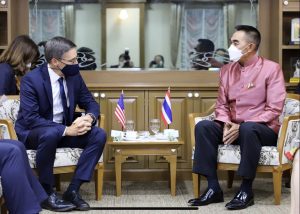Thailand, like most other nations in Southeast Asia, strives to maintain an equilibrium between the United States and China in order to safeguard its sovereignty. Following the bloodless 2014 coup that brought Prayut Chan-o-cha into power, the American alliance with Thailand withered while Thailand’s relations with China blossomed. But now, as the 2022 Cobra Gold military exercise is approaching, it appears that the balance of power is tilting back in the Washington’s favor.
As I discussed in a previous article for The Diplomat, Sino-Thai relations in recent times have been far from smooth. A Nikkei Asia analysis released a few weeks ago underscores this observation, stating that Thailand’s indifference to China’s railway project has significantly hurt China’s Belt and Road rail ambitions. Diverging priorities, such as Thailand’s reopening plans versus China’s persistent “zero COVID” policy, has pulled the two Asian brothers further apart.
In contrast, U.S.-Thailand ties have improved considerably since the Trump administration, in large part thanks to Trump’s lack of interest in democracy promotion. Many assumed that President Joe Biden, as a Democrat who served directly under Obama, would depart from Trump’s approach and put a strong emphasis on the democracy aspect. However, Biden has maintained a significant level of continuity to Trump’s Asia policy. While Thailand was excluded from the much anticipated “summit for democracy”, the Biden administration has uncharacteristically refrained from criticizing Thailand’s internal affairs to avoid upsetting the military-backed elites in Bangkok. It is clear that the U.S. under Biden’s presidency is seeking to strike a balance between geostrategic interests and democracy promotion. And, as the strategic competition with China escalates, the U.S. will most likely pay less attention to Thailand’s “undemocratic” behaviors.
This year’s Cobra Gold, a long-running annual military exercise which emerged as a bilateral drill between Washington and Bangkok before evolving into a full-fledged multinational event, is scheduled to be held in Thailand’s central and eastern provinces from February 20 until early March. China has been included in Cobra Gold since 2014, yet its role has been limited to humanitarian operations.
Unlike the “light year” exercise in 2021, which focused on staff planning and humanitarian tasks, the scale of the 2022 Cobra Gold was initially set to be full and heavy, with the inclusion of live-fire exercises featuring air, sea, and land forces. As reported by the Thai media, over 10,000 U.S. troops – the biggest figure in a decade – were expected to join.
Nevertheless, the rapid spread of the Omicron variant of COVID-19 has forced the downsizing of personnel and training activities. A spike in infections in Japan linked to U.S. bases in Okinawa has left the U.S. military with an image problem, and Thai authorities are not ready to take risks that could further jeopardize Thailand’s tourism revival plans. A military source confirmed that a total of 3,600 soldiers – 1,900 from Thailand and 1,700 from the U.S. and elsewhere – will participate in this year’s drill, while large-scale exercises involving evacuations and amphibious landings will be called off.
What matters more than the inevitable downscaling is the high level of U.S. engagement with Thailand over the past few months. Commander of the U.S. Indo-Pacific Command, Adm. John Aquilino, highlighted the significance of a robust Cobra Gold exercise in maintaining regional peace during his visit to Bangkok last October. He added that he wishes to see an expansion of Cobra Gold and U.S.-Thailand maritime cooperation, with the involvement of warships, when Thailand is ready.
The State Department Counselor Derek Chollet landed in Bangkok shortly after Adm. Aquilino’s departure to discuss strategic issues with senior Thai officials. In December, U.S. Secretary of State Antony Blinken was scheduled to visit Bangkok as part of his Southeast Asia tour in an apparent effort to counter China’s influence, but cancelled the visit after a press member traveling with the U.S. delegation tested positive for COVID-19. Blinken was expected to reaffirm the U.S.-Thailand alliance and speak about the “Free and Open Indo-Pacific,” the Mekong issue, and the Myanmar conflict. Concurrent to Blinken’s planned visit, Thailand’s Chief of Defense Forces Gen. Chalermpol Srisawasdi took a nine-day trip to the U.S. – the first overseas trip since he took office in September 2020 – to meet Pentagon officials, including Chairman of the Joint Chiefs of Staff Gen. Mark Milley.
These high-profile exchanges coincide with the Thai Air Force’s plan to purchase eight U.S.-made F-35 stealth jets. A budget of 13.8 billion baht ($413.67 million) to buy the first four jets starting in the 2023 fiscal year has recently been approved, in principle, by the Thai cabinet.
Some Thai observers worry that Thailand’s reenergized security alliance with the U.S. could send the wrong signals to China. This was one of the reasons cited in a letter submitted by a protest group to the U.S. Embassy in Bangkok earlier this January, calling for the cancellation of the 2022 Cobra Gold. The fear is not completely far-fetched, considering the overt great power competition, heightened tensions at potential Asian flashpoints (the Korean Peninsula, East China Sea, South China Sea, Taiwan, and Myanmar), and the formation of military pacts like the AUKUS (and its extensions) and the Russia-China-North Korea partnership.
At this stage, many details of the 2022 Cobra Gold still remain unclear. But one thing is certain: This year’s drill, more than any other year, will be closely monitored by China.

































